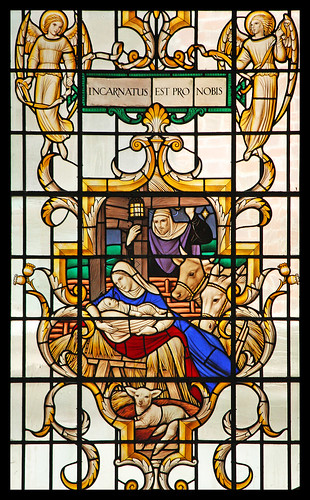This past Sunday we rounded up a discussion of Christology in the Sunday school class I teach. In response to the suggestion that belief in the “divinity” of Jesus might be essential to Christianity, I took a different tack than I usually might. Usually I would have pointed out that most or all of the earliest Christians might not have been “Christian” by this standard (on this subject I recommend the podcast on the radio show Unbelievable featuring a discussion between James Crossley and Michael Bird). This time, I asked what “divinity” meant, and then followed up with another question, one that I want to pose here and expand upon.
 Most if not all Christians would affirm that their encounter with Jesus has mediated to them an experience of God. But what does it mean to say “God was in Christ“? More importantly, what would the difference be between meeting an individual who was a pre-existent divine person who had taken on human limitations, and meeting an individual who was more fully inspired or “possessed” by God than anyone else had been? Could anyone encountering such individuals distinguish which was which on the basis of their encounter?
Most if not all Christians would affirm that their encounter with Jesus has mediated to them an experience of God. But what does it mean to say “God was in Christ“? More importantly, what would the difference be between meeting an individual who was a pre-existent divine person who had taken on human limitations, and meeting an individual who was more fully inspired or “possessed” by God than anyone else had been? Could anyone encountering such individuals distinguish which was which on the basis of their encounter? Going further, could any historical evidence demonstrate that a person was God incarnate (as opposed to demonstrating that the individual believed he or she was God incarnate, or was thought to be by others)? Could any historical evidence demonstrate that someone was 100% divinely inspired, or that they were merely more fully open to God than others have been?
In light of our inability to settle such matters by any means that all participants in discussions of Christology would agree on, what is the appropriate response? Is it time to stop expecting Christians to adhere to creedal statements that affirm things which cannot be proven, even to the satisfaction of all Christians?
There have been a lot of discussions lately about quests for the historical Jesus (see for instance the posts by April DeConick, Bruce Chilton, Joseph Hoffman, James Crossley (more than once), Tom Verenna, Bob Macdonald, and others). Christology should not ignore the results of history, any more than Christian theologians reflecting on cosmology can afford to ignore the evidence from physics and astronomy. And when it goes beyond it, we should acknowledge that we are entering an area of great subjectivity, one that not only has been but ought to be in flux across the range of human history, culture and experience. Much confusion about the figure of Jesus has resulted precisely because Christians have confused their own Christologies with what historians can and should say about Jesus, and have often failed to acknowledge what historians cannot say on the basis of the tools and evidence of their discipline.












